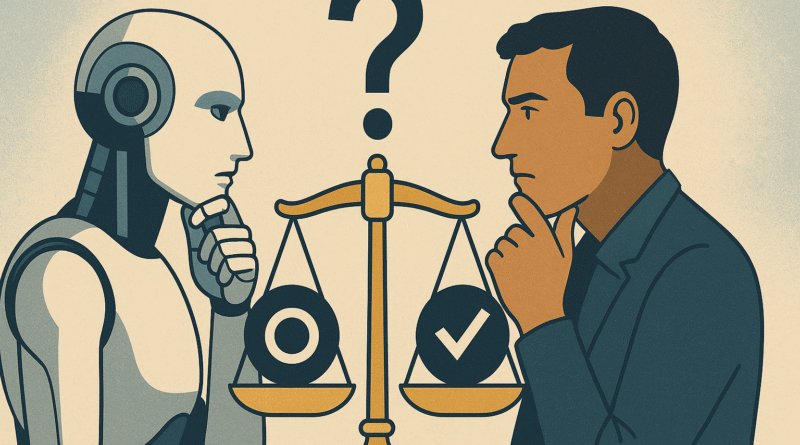The Ethics of AI: How Will We Regulate the Machines We Create?
Ethics of AI Introduction
I’ll never forget the first time I saw an AI generate a fake video of a politician saying something they never actually said. It felt like magic and a warning.
We’re entering a future where intelligent systems not only answer our questions but shape our reality. And yet, the rules guiding these systems are still vague, scattered, and often reactive.
That’s what this article is about: the ethics of AI. Not just the big questions, but how we, as a society, actually regulate the machines we’re building, before they get ahead of us.
Why This Matters Now
AI isn’t just about automation anymore. It’s in medicine, justice, hiring, warfare, even love. And yet:
- 72% of AI researchers agree current regulations are insufficient (Stanford AI Index, 2024).
- Less than 10 countries have comprehensive AI laws.
- Some companies still use “black box” AI with no explanation of how decisions are made.
We’re coding systems with real-world power, often with zero transparency or oversight.
The Root Problem Most People Miss
The problem isn’t just about bad AI. It’s about unregulated AI.
When we think of ethics, we imagine robots turning evil. But in reality, most harm comes from:
- Biased data leading to unfair results
- Corporate incentives pushing performance over responsibility
- Governments too slow to keep up
Ethics isn’t about punishing AI. It’s about setting up the right systems before something goes wrong.
5 Ethical Challenges of AI (and How to Approach Them)
1. Bias and Discrimination
What it is: AI trained on biased data can reinforce social inequality.
Why it matters: Hiring systems, credit scoring, and even healthcare diagnostics have shown racial and gender bias.
Action Step: Push for dataset audits and explainable AI standards.
2. Lack of Accountability
Who do you blame when an AI-driven car crashes?
Solution: Shared accountability models between developers, users, and regulators.
3. Surveillance and Privacy Invasion
Example: Facial recognition used without consent in public spaces.
What to do: Advocate for strong data protection laws and transparent opt-in systems.
4. Autonomous Weapons
This isn’t sci-fi. Killer drones already exist.
Global concern: UN discussions are ongoing, but treaties lag behind tech.
Push for: International AI weapons agreements.
5. Manipulation and Misinformation
Deepfakes, AI chatbots that spread propaganda, algorithmic manipulation, these erode trust in reality.
Solution: Content authenticity standards + AI transparency labels.
Tools and Frameworks for AI Governance
Here’s what governments and companies are starting to use:
- OECD AI Principles – International framework for trustworthy AI
- EU AI Act – First major legislative proposal to classify AI by risk level
- NIST AI Risk Management Framework – U.S.-based guide for responsible AI development
We’re still early. But these tools are blueprints for what’s possible.
Common Pitfalls in Regulating AI
- Too vague: “Ethical AI” sounds nice, but what exactly does it mean?
- Too reactive: Policies often follow scandals instead of preventing them.
- Too slow: Tech evolves in months. Laws evolve in decades.
- Too corporate-driven: When the rules are written by those profiting from AI, don’t expect public-first outcomes.
Bonus Tips: How Individuals Can Advocate for Ethical AI
Even if you’re not a policymaker, you still have power:
- Demand AI transparency from the apps and platforms you use
- Support companies committed to ethical AI (e.g., open-source, explainable systems)
- Learn how to audit your own data trail using free tools from our list of Top 10 AI Tools.
- Share resources like AI Now Institute or Partnership on AI
FAQ
Q: Isn’t it too early to regulate AI?
No. The damage is already happening. Regulation isn’t about slowing down, it’s about staying in control.
Q: Who should lead AI ethics, governments or companies?
Both. But government must set the rules, or profit will always win.
Q: Can AI ever be truly ethical?
Only if we make the humans behind it accountable.
Final Thoughts
AI is a mirror. It reflects the values we bake into it.
If we care about fairness, transparency, and responsibility, then those must become part of every algorithm, not just the mission statement.
Ethical AI isn’t a luxury. It’s a necessity. And it starts with asking the hard questions, now.
Want to explore how AI is changing creative industries? Read: The Rise of Generative AI: What It Means for Content Creation.

Pingback: Humanoid Olympiad: Where Robots and Humans Compete Together
Pingback: Future of AI: 9 Brilliant Theories Defines Future of AI 2030
Pingback: 3 Scary Truths About AI Surveillance in 2025
Pingback: AI Robocalls Politics Warning: 5 Dangerous Threats Democracy
Pingback: AI Superintelligence : 3 Dangerous Predictions